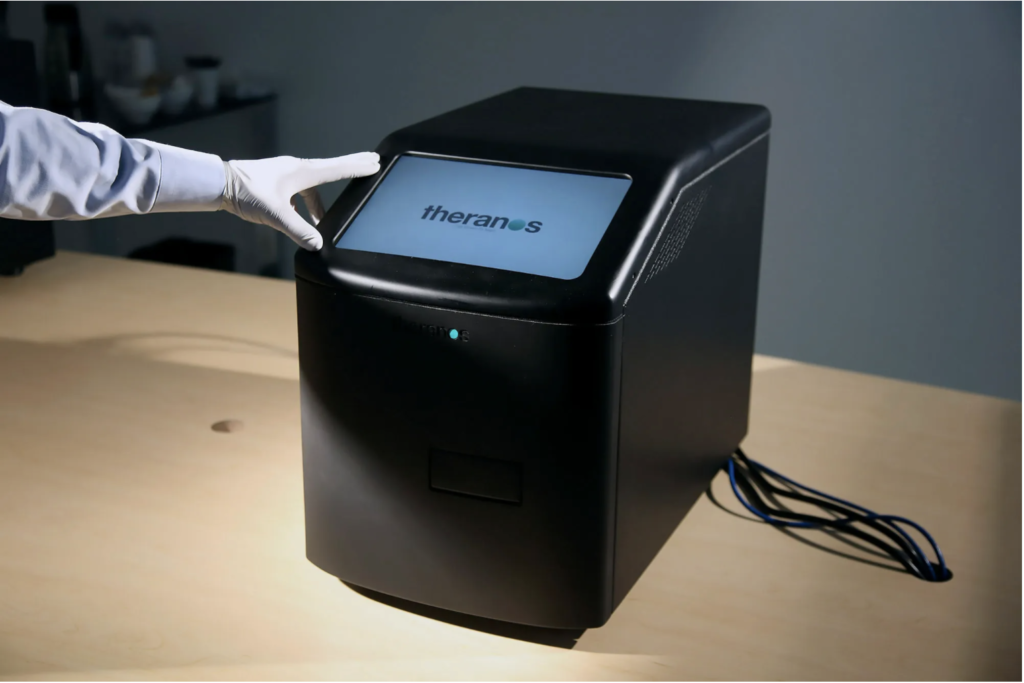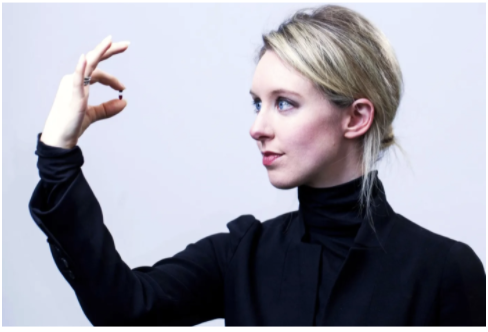Theranos Founder, Elizabeth Holmes, Faces Trial for Fraud
In 2014, Elizabeth Holmes became the world’s youngest self-made woman billionaire (5). Only two years later, it was discovered that her company, Thearnos, and it’s blood sampling technology was a sham (5). Thearnos’s technology claimed to detail a complete health diagnostic report from a finger-prick worth of blood. Now, Holmes faces 12 charges of fraud and a potential 20 years in prison (4). Her trial hopes to shed light on whether or not Holmes is guilty of first-class fraud.
Before founding Theranos, Holmes was a college student at Stanford pursuing chemical engineering (7). During her Sophomore year, she decided to drop out of university to start a biomedical company (1). Her vision was to create a device that could gather hundreds to thousands of pieces of medical information from a single finger prick as opposed to the 5-10mL of blood required for most medical tests (1). Holmes believed that the finger prick method would be far more convenient and accessible for patients.

Over a short period of twelve years, Theranos grew exponentially and at one point, was valued at an extremely impressive nine billion dollars (1). In part, the company was able to grow due to famous investors and board members like Larry Ellison, co-founder of Oracle, Tim Draper, venture capitalist, and the former secretary of state, George Shultz (1). Despite the fact that the technology never actually worked, Holmes was still able to secure monumental deals with companies such as Walgreens (1).
However, this series of successes didn’t last long. Starting in 2015, accusations accusing Theranos of fraudulent behavior emerged, and three years later, the company came tumbling down. It was revealed that the company had been fabricating the results of the blood tests to list inaccurate results (1). In 2018, journalist John Carreyou wrote an accusatory and convincing book titled Bad Blood, which detailed Holmes’ crimes and failures to produce a working technology (1). Holmes stepped down as CEO of Thearnos in June of 2018, and her trial was initially set for summer 2020. However, it was delayed until the end of August 2021 by the pandemic and the birth of her baby (1).
Now, in the fall of 2021, the Holmes trial has officially begun, and four weeks of proceedings have gone by. Initially, Lance Wade, Holmes’s defence attorney, took the stance that, “In the end, Theranos failed, and Miss Holmes walked away with nothing. But failure is not a crime. Trying your hardest and coming up short is not a crime” (6). Wade and Holmes’s legal team wants to express that Holmes’s only crime was failing to succeed, and that in itself is not illegal.
In week four of the Thearnos proceedings, Dr. Adam Rossendorf, a Thearnos lab director from 2013 to 2014, took the stand (4). Rossendorf noted that at one point, the Thearnos tests became so inaccurate that eventually they had zero diagnostic accuracy (2). Despite his expressed concerns, Rossendorf claimed that Holmes ignored his complaints and went on promoting the inadequate technology (2). Rossendorf told the prosecutors that, “The company was more about P.R. and fundraising than patient care” (2). Furthermore, the journalist who broke the story, John Carreyou, seconded Rossendorfs claims by confirming that Rossendorf was the “first and most important source to breaking the story” (2). Rossendorf’s quotes illustrate that the goal of Thearnos shifted from one scientifically motivated to a company desperate to receive positive press regardless of scientific accuracy.

In earlier weeks, Erika Cheung, a former laboratory associate for Thearnos, also provided some key data regarding Holmes’s dismissive and duplicative behavior. Cheung recalled that she had been alarmed to find that Thearnos had deleted test results when they were inaccurate (3). She also noted that Thearnos had also not responded nor addressed her concerns (3).
The Elizabeth Holmes trial is expected to continue for several more months. As of now, it is not yet clear whether Holmes will face those 20 years of prison. Some key players in the case have yet to testify, including massive whistleblower, Tyler Shultz (4), who told New York public-health lab that Thearnos had manipulated their proficiency testing (8). Thus, the result of the trial is still up in the air; will Elizabeth Holmes go from a billionaire to a prisoner?
